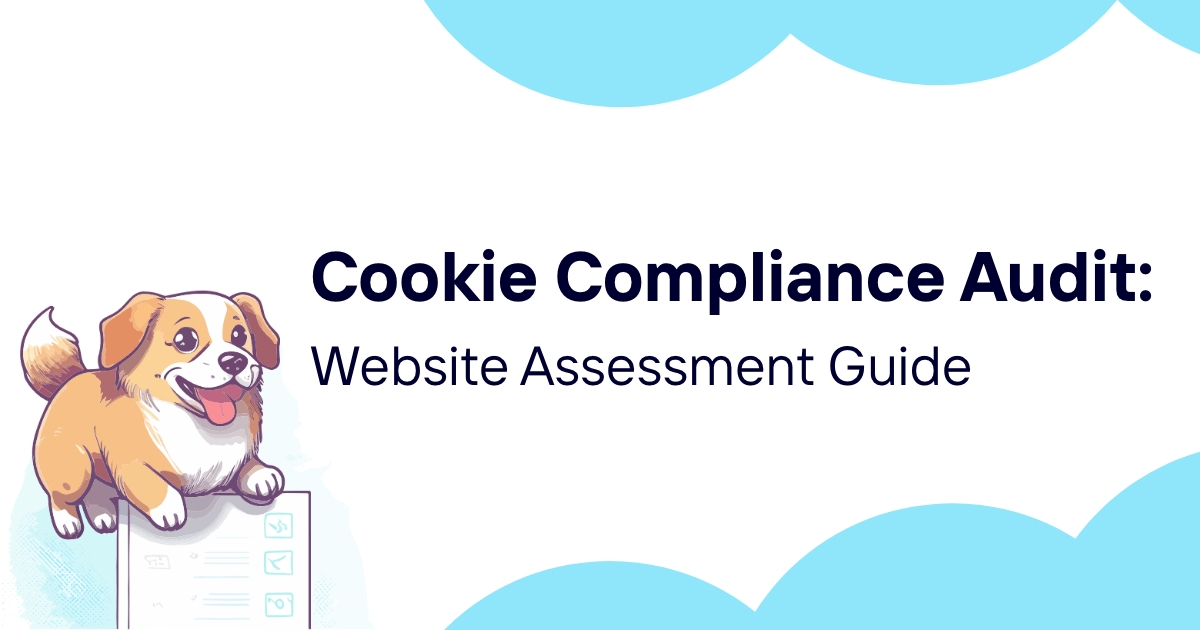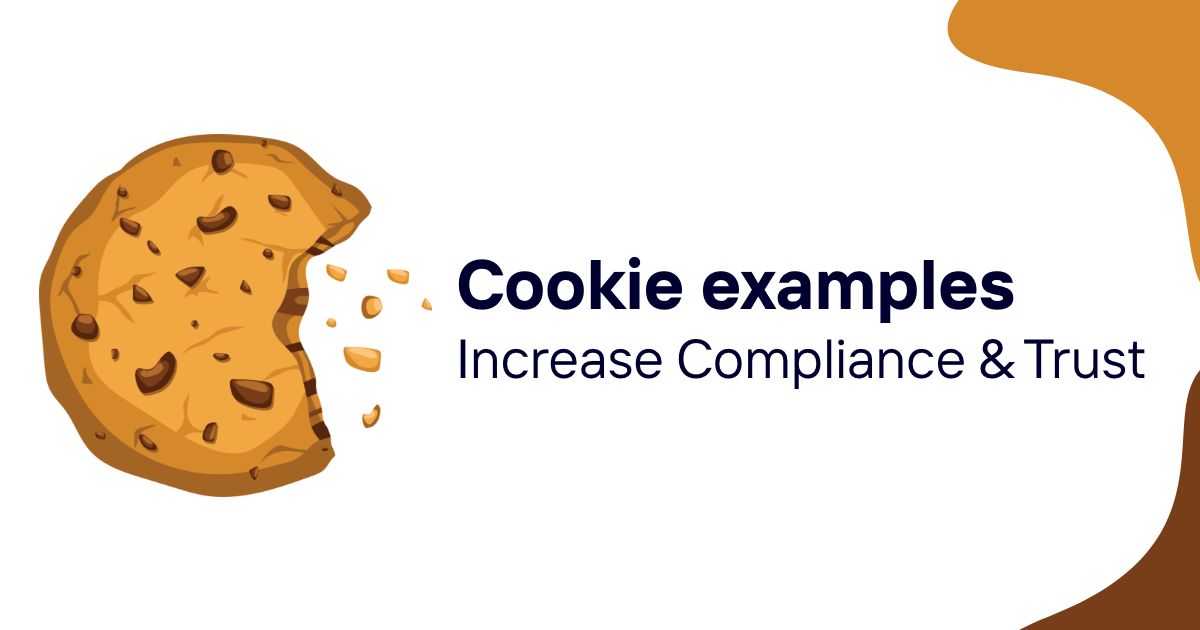Your website might be dropping cookies illegally right now without you knowing it. Most organizations assume their cookie compliance is adequate, but comprehensive audits regularly uncover serious violations that could trigger regulatory investigations.
Cookie compliance audits reveal hidden tracking technologies, consent management gaps, and third-party integrations that create unexpected legal risks. The average website audit identifies 40-60% more cookies than organizations expect to find.
This guide provides step-by-step methodology for conducting thorough cookie compliance audits that identify all privacy risks and ensure your website meets GDPR requirements.
Cookie Compliance Audit Overview
Audit Scope and Objectives
A comprehensive cookie audit examines all tracking technologies on your website including cookies, web beacons, local storage, and similar technologies that process personal data.
The audit evaluates legal compliance with GDPR consent requirements, privacy policy accuracy, and technical implementation of cookie management systems.
Audit objectives include identifying unauthorized cookies, assessing consent mechanisms, and verifying that actual cookie practices match your documented policies and procedures.
Regulatory Framework Assessment
GDPR requires explicit consent for non-essential cookies before they're placed on user devices. Pre-checked boxes, implied consent, and cookie walls no longer satisfy legal requirements.
ePrivacy Directive requirements often provide stricter cookie consent standards than baseline GDPR provisions. Understanding both frameworks ensures comprehensive compliance assessment.
National implementations of EU cookie laws vary slightly between member states. Audits should consider specific requirements in jurisdictions where your website operates.
Audit Frequency and Triggers
Regular annual audits help maintain ongoing compliance as websites evolve and new tracking technologies are implemented without privacy team awareness.
Trigger audits immediately after major website updates, new third-party integrations, or marketing technology implementations that could introduce additional cookies.
Regulatory guidance changes or enforcement actions in your industry may require special audit attention to ensure your practices align with evolving expectations.
Audit Team Requirements
Include privacy specialists who understand GDPR requirements and can assess legal compliance of cookie practices and consent mechanisms.
Technical team members provide expertise on website functionality, content management systems, and tracking technology implementation details.
Legal counsel should review audit findings and recommendations to ensure compliance strategies align with current regulatory requirements and industry best practices.
Audit Preparation and Planning
Website Inventory Development
Create comprehensive lists of all websites, subdomains, mobile apps, and digital properties that require cookie compliance assessment.
Document content management systems, e-commerce platforms, and technical infrastructure that might influence cookie deployment and management capabilities.
Identify all departments and teams that can add tracking technologies or third-party integrations without centralized privacy oversight.
Stakeholder Engagement
Interview marketing teams about advertising technologies, analytics tools, and customer tracking systems they use for campaign management and performance measurement.
Consult IT departments about security monitoring, performance optimization, and technical cookies that support website functionality but might require consent.
Engage customer service teams about chat widgets, support tools, and communication platforms that often place functional cookies on visitor devices.
Technical Environment Assessment
Review content management system configurations, plugin installations, and template modifications that might introduce tracking technologies without explicit approval.
Examine third-party service integrations including analytics platforms, advertising networks, social media widgets, and customer support tools.
Assess development and staging environments to understand how cookies are implemented and whether testing activities could affect compliance.
Documentation Collection
Gather current privacy policies, cookie policies, and consent management documentation to compare actual practices with published commitments.
Collect vendor contracts and data processing agreements to understand third-party cookie obligations and shared compliance responsibilities.
Review previous audit reports, compliance assessments, and privacy impact assessments that might identify known cookie compliance issues.
Cookie Discovery and Classification
Automated Scanning Methods
Website scanning tools provide comprehensive cookie discovery by crawling all website pages and documenting every tracking technology encountered during navigation.
Browser developer tools reveal cookies placed during real user sessions including dynamic cookies that only appear after specific user interactions or time delays.
Third-party audit platforms offer specialized cookie detection capabilities that identify hidden tracking technologies and unusual cookie implementations.
Manual Discovery Techniques
Navigate through all website sections including protected areas, checkout processes, and user account pages where additional cookies might be deployed.
Test different user scenarios such as newsletter signups, contact form submissions, and product downloads that could trigger additional tracking.
Examine website source code for embedded scripts, tracking pixels, and third-party integrations that might not be apparent through automated scanning.
Cookie Classification Framework
Strictly necessary cookies enable essential website functions like security, network management, and basic navigation. These cookies don't require consent under GDPR.
Performance and analytics cookies collect information about website usage patterns, page load times, and user behavior for optimization purposes. These require consent.
Functional cookies remember user preferences like language settings, currency choices, or customized layouts. Most functional cookies require consent despite improving user experience.
Marketing and advertising cookies enable targeted advertising, track campaign effectiveness, and build user profiles for commercial purposes. These always require consent.
Third-Party Cookie Identification
Document all third-party services that place cookies on your website including analytics providers, advertising networks, social media platforms, and customer support tools.
Identify first-party cookies that share data with third parties through server-side integration even when the cookies themselves appear to be internal.
Assess cookie synchronization activities where multiple third parties share user identifiers to build comprehensive tracking profiles across different platforms.
Consent Mechanism Assessment
Consent Banner Evaluation
Test consent mechanisms across different browsers, devices, and user scenarios to ensure consistent functionality and compliant user experiences.
Verify that non-essential cookies are actually blocked until users provide consent rather than just displaying banner notices without enforcement.
Assess consent banner design for compliance with GDPR requirements including clear accept/reject options, granular cookie category choices, and easy consent withdrawal.
Consent Management Platform Review
Evaluate consent management system configuration to ensure it accurately reflects your website's actual cookie usage and provides appropriate control options.
Test consent enforcement mechanisms to verify that cookie preferences are properly implemented and respected throughout user sessions.
Review consent records and documentation capabilities to ensure you can demonstrate valid consent during regulatory investigations.
User Experience Testing
Navigate your website as a typical user to assess whether consent processes are clear, fair, and provide meaningful choice without manipulation.
Test consent withdrawal mechanisms to ensure users can easily change their preferences without searching through complex menu systems.
Evaluate consent renewal processes for returning visitors to ensure ongoing consent validity and proper preference management.
Legal Basis Documentation
Verify that consent is the appropriate legal basis for each cookie category or whether alternative grounds like legitimate interest might be more suitable.
Document legal basis decisions for each cookie type and ensure privacy policies accurately reflect the legal grounds for different processing activities.
Assess consent specificity to ensure users understand exactly what they're agreeing to rather than providing blanket permission for undefined activities.
Legal Basis Verification
Consent Validity Assessment
Evaluate whether cookie consent meets GDPR requirements for being freely given, specific, informed, and unambiguous through clear affirmative action.
Assess consent request timing to ensure users can make informed decisions before non-essential cookies are placed on their devices.
Review consent documentation and record-keeping systems to ensure you can prove valid consent was obtained when required.
Legitimate Interest Analysis
Determine whether any cookies might qualify for legitimate interest processing instead of requiring consent, particularly for certain analytics or security purposes.
Conduct balancing tests for potential legitimate interest cookies considering user expectations, privacy impact, and business necessity.
Document legitimate interest assessments following proper methodology to ensure regulatory compliance and defensible decision-making.
Legal Basis Consistency
Verify that legal basis claims in privacy policies match actual cookie implementation and consent management system configuration.
Ensure consistent legal basis application across different website sections, user types, and geographic regions where requirements might vary.
Review legal basis documentation for accuracy and completeness to support compliance demonstrations during potential regulatory review.
Cross-Border Considerations
Assess whether cookie practices comply with privacy laws in all jurisdictions where your website operates, including non-EU countries with similar requirements.
Consider data transfer implications when cookies facilitate personal data sharing with third parties in different countries or regulatory environments.
Document compliance strategies for serving users from multiple jurisdictions with potentially different cookie consent requirements and legal frameworks.
Third-Party Cookie Analysis
Vendor Assessment Process
Inventory all third-party services that place cookies or access personal data through your website including hidden integrations that might not be immediately apparent.
Review vendor privacy policies and cookie practices to understand what data they collect, how it's used, and what consent obligations they create.
Assess vendor compliance capabilities including their GDPR readiness, consent management integration, and data processing safeguards.
Data Processing Agreement Review
Examine contracts with third-party cookie providers to ensure appropriate data processing agreements are in place covering GDPR compliance responsibilities.
Verify that vendor agreements include clear provisions about consent management, data retention, and individual rights handling for cookie-related processing.
Assess liability allocation and compliance support provisions in vendor contracts to understand shared responsibility for cookie compliance.
Cookie Synchronization Activities
Identify cookie syncing activities where third parties share user identifiers or personal data to build comprehensive tracking profiles across platforms.
Evaluate whether cookie synchronization creates additional consent requirements or privacy risks that need specific management attention.
Document data flows between third parties to understand complete privacy impact of your website's cookie ecosystem.
Vendor Monitoring Procedures
Establish ongoing monitoring of third-party cookie practices to identify changes that might affect your compliance status or create new privacy risks.
Implement procedures for receiving vendor breach notifications and privacy incident reports that could affect cookie-related personal data.
Plan regular vendor compliance reviews to ensure continued adherence to privacy requirements and contractual obligations over time.
Audit Reporting and Documentation
Findings Documentation
Document all identified cookies with detailed information about their purposes, data collection practices, retention periods, and legal basis for processing.
Record consent mechanism deficiencies including technical problems, user experience issues, and legal compliance gaps that require remediation.
Identify third-party compliance risks including vendor assessment findings, contract deficiencies, and ongoing monitoring needs.
Risk Assessment and Prioritization
Evaluate privacy risks associated with each audit finding considering regulatory penalty potential, individual harm possibility, and business impact.
Prioritize remediation activities based on risk severity, implementation complexity, and resource requirements to develop practical action plans.
Consider cumulative compliance risks from multiple minor issues that collectively create significant regulatory exposure requiring coordinated response.
Compliance Gap Analysis
Compare current practices with GDPR requirements to identify specific areas where improvements are needed for full compliance.
Assess policy accuracy by comparing documented cookie practices with actual website implementation and user experience reality.
Evaluate consent management effectiveness including user understanding, preference respect, and record-keeping adequacy.
Recommendations Development
Provide specific, actionable recommendations for addressing each identified compliance gap with clear implementation guidance and resource requirements.
Include both immediate fixes for urgent compliance issues and longer-term improvements for comprehensive privacy program enhancement.
Consider integration with broader privacy initiatives including data breach preparedness and overall compliance strategy development.
Remediation Planning and Implementation
Priority Action Planning
Address urgent compliance issues first, particularly those involving unauthorized cookie placement or consent mechanism failures that create immediate regulatory risk.
Plan systematic remediation for complex issues requiring significant technical changes, vendor negotiations, or policy updates that take time to implement properly.
Coordinate remediation activities with business operations to minimize disruption while ensuring timely compliance improvements.
Technical Implementation
Update consent management systems to properly block non-essential cookies until valid consent is obtained through compliant mechanisms.
Configure cookie management platforms to accurately reflect your website's actual tracking technologies and provide appropriate user control options.
Implement cookie auditing tools and monitoring systems that provide ongoing visibility into website tracking activities and compliance status.
Policy and Documentation Updates
Revise privacy policies and cookie notices to accurately reflect current practices and provide clear information about tracking technologies and user choices.
Update vendor contracts and data processing agreements to include appropriate cookie compliance provisions and shared responsibility frameworks.
Develop ongoing audit procedures and compliance monitoring activities that maintain cookie compliance as websites and technologies evolve.
Training and Awareness
Provide team training on cookie compliance requirements and audit findings to prevent future violations and ensure ongoing compliance awareness.
Establish procedures for privacy review of new tracking technologies, third-party integrations, and website changes that could affect cookie compliance.
Create escalation procedures for cookie compliance questions and decision-making that ensure appropriate privacy oversight of tracking technology decisions.
Cookie compliance audits provide essential protection against regulatory penalties while ensuring your website respects user privacy preferences. Regular comprehensive audits identify risks before they become compliance problems.
Effective audit programs require ongoing attention and resources but provide valuable risk mitigation and competitive advantages through demonstrated privacy leadership.
Ready to conduct comprehensive cookie compliance audits? Use ComplyDog and access audit tools, compliance templates, and monitoring capabilities that support thorough cookie assessment and ongoing compliance management.


















